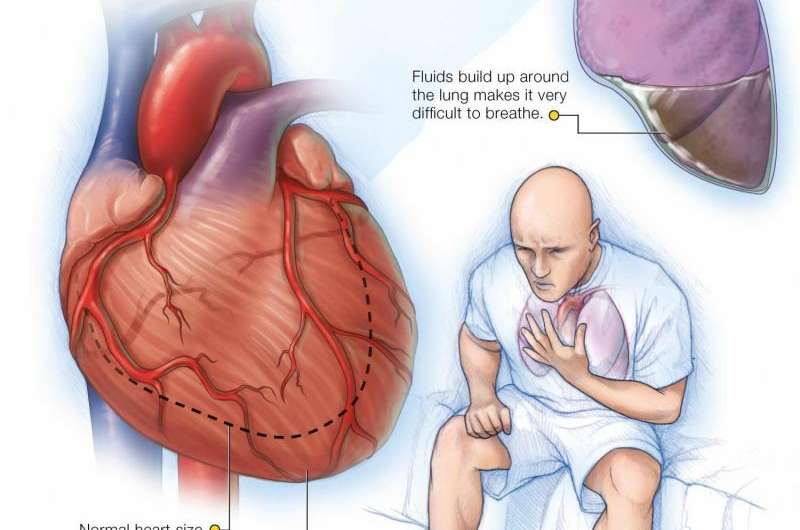Common medication for heart failure patients does not increase activity level

Heart failure patients with preserved ejection fraction (HFpEF)—where the heart becomes stiff and cannot relax or fill properly—did not have increased exercise tolerance after taking isosorbide mononitrate, compared to a placebo, according to a study presented today at the American Heart Association's Scientific Sessions 2015. The findings come from the National Heart, Lung, and Blood Institute's Heart Failure Clinical Research Network and are also published in the New England Journal of Medicine.
Importantly, the HFpEF patients' daily activity level was assessed with accelerometers, devices patients wore to measure movement throughout the study. Daily activity progressively and significantly decreased as the dose of the nitrate increased, says Margaret Redfield, M.D., first author and cardiologist at Mayo Clinic's Rochester, Minnesota, campus.
"It is important to relieve symptoms in heart failure, so patients can be more active. Inactivity perpetuates deconditioning and frailty in heart failure," Dr. Redfield says. "While nitrates are commonly prescribed for symptom relief in HFpEF, the effects of nitrates in patients with HFpEF have not been studied."
In a multicenter, randomized, double-blind, two-period, 12-week crossover study called the Nitrate's Effect on Activity Tolerance in Heart Failure with Preserved Ejection Fraction (NEAT-HFpEF) Trial, 110 patients with HFpEF at 20 sites were studied. Patients were randomized into one of two treatment groups:
1. Six weeks of placebo first, followed by six weeks of isosorbide mononitrate
2. Six weeks of isosorbide mononitrate, followed by six weeks of placebo
Each six-week treatment period began with two weeks without drug treatment, considered the baseline. When taking the isosorbide mononitrate, the patients took 30 milligrams per day for a week, then 60 milligrams per day for a week and then finally 120 milligrams per day for at least two weeks. Each patient wore an accelerometer 24 hours a day, except when bathing or swimming, and underwent intermittent exercise tests.
Results showed that patients were active for 18 fewer minutes per day during the 120-milligram dose of isosorbide mononitrate, compared to when they received a placebo. Previous observational studies using accelerometer data from implanted pacing defibrillator devices in patients with heart failure and reduced ejection indicate that even 10 fewer minutes of activity per day is associated with adverse outcomes, such as death or hospitalization for heart failure.
During all study drug doses (30 to 120milligrams), patients were less active overall per day, compared to when they received the placebo. Compared to the baseline, the average daily accelerometer units decreased progressively with increasing doses of the nitrate, but not the placebo. In addition, the nitrate also did not improve exercise test (six-minute walk distance) or quality of life scores.
"We speculated that the daily activity data is more sensitive to the true impact of a drug on overall functional status," Dr. Redfield says. "Unfortunately, nitrates actually decreased daily activity in heart failure patients. The decrease in activity occurred in the absence of adverse effects on six-minute walk distance and in association with directionally adverse, albeit not statistically significant, effects on quality-of-life scores. These findings suggest that activity levels were sensitive to subtle adverse effects of isosorbide mononitrate. Use of patient-worn devices to assess the impact of therapies on patient's lives is an important advancement in the way new therapies are studied."
















